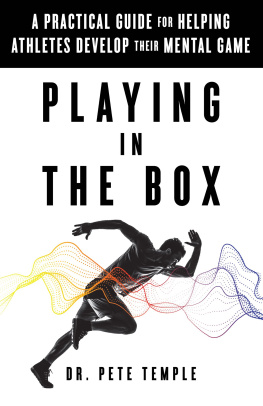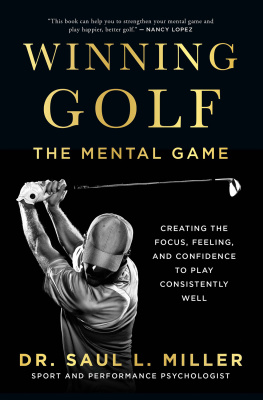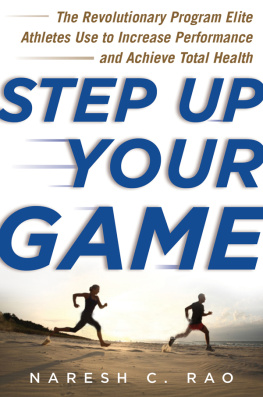Introduction
The Unbalanced Athlete
When I played Little League back in the late seventies, we rode our bikes to practice, or our parents dropped us off at the town baseball field. A few parents would hang around and watch, but most either left to go to work or run errands.
Our coach was usually a young guy whod played baseball in high school, and he had all the expertise we needed. Most of us knew how to catch and hit, and the coach would show us how to backhand a grounder or pivot at second base for a double play. He would hit grounders for the infielders and fly balls for the outfielders, and that was practice. We played twelve to fifteen games a year, and our seasons ended in early August, so families could take vacations. When fall came, we played football.
Thirty years later, my son started Little League. And I quickly realized things had changed.
I was one of five coaches for my sons team. None of the players rode their bikes to practice because they had too much to carry, such as bats and equipment bags with their names stitched onTO them. The dads built a custom batting cage so the coaches could give regular hitting instruction. In addition, some kids had private hitting coaches and pitching coaches.
My sons team had a fifty - game schedule. Half of those games were out of town, and some of them were out of state. Many of the parents would stay to watch practice, and the games were huge events. Families brought lawn chairs, canopies, and coolers, settling in for three hours of watching twelve - year - olds play baseball.
Not only was this atmosphere more intense than any Id experienced as a Little Leaguer, but the kids themselves were different. They were fitter and stronger than my teammates and I had been. The kids on my sons team hydrated with Gatorade and ate protein bars. Their physical and technical skills were way beyond those of the twelve - year - olds of my day. Many of them had been to baseball camps, and some played year - round or for more than one team. The players and parents commitment to the sport was far more significant than it had been in my day.
During the last thirty years, other youth sports have changed in the same way. Many young swimmers train twice a day, putting in ten - thousand - meter workouts and pulling on expensive, high - tech racing suits for big meets. Young basketball players are playing year - round on travel or AAU teams, developing blinding on - court speed, and ankle - snapping crossover dribbles that make college coaches drool.
Whatever the sport, todays young athletes focus on their physical and technical development has elevated the quality of their overall play. But its also elevated the expectations these athletes face. And that increased pressure has exposed a gaping hole in these athletes training: their mental preparation.
We can train high school athletes to throw a vicious slider or run a mile in under five minutes, but we dont do enough to help them cope with the mental and emotional aspects of competing at a high level under the pressure of all their elite coaching and training. The result is that a lot of young athletes, despite their incredible skills and fitness, struggle to excel at and enjoy the sports for which they train so hard.
Three Gears Working Together
When I talk about the complete athlete, I am referring to someone who has the highly developed physical, technical, and mental tools they need to succeed. Every successful athlete has those three gearsthe physical, technical, and mentaland those three gears turn simultaneously. Each gear helps the other two turn more smoothly, and when each gear is contributing, the athletic process seems almost effortless. Think OF Steph Curry darting down an open lane to drop in a floater over his defender. He makes it look so easy.
However, if one of those gears stalls, the other two also get stuck.

As a sports psychologist, Ive worked with dozens of young players who have excellent technical and physical skills theyve spent years developing. Their parents have also made significant investments of time, money, and emotional support. During practice, these young athletes can fly around the court or casually line one curveball after another to the gap in center. But during games, something happens. They become tentative. They miss shots they never miss in practice. They get angry and lose confidence. Theyre unsure how to react in situations theyve dealt with hundreds of times during training.
These athletes come to me in frustration. Boys and girls. Theyve spent so much time training and practicing that their expectations of themselves and the expectations of their parents, coaches, and teammates combine to put tremendous pressure on them.
I try to help these athletes find a better balance between their three gears. Most of the time, its the mental gear thats slowing them down, and I help them understand the fundamental components of that mental gear, and how they can strengthen those components. Our goal is to build strong mental mechanicsthe thought processes and habits that keep their mental gear sound and reliable. When these athletes can develop their mental game in this way, their cognitive, physical, and technical gears can turn in unison again.
This book will help you develop your mental gear. Youll learn techniques for handling pressure, controlling your emotions, moving past your mistakes, and building a frame of mind that allows you to excel at and love your sport again. A well - developed mental gear allows you to deploy your technical and physical abilities at the highest level. In addition to preparing you to compete, a finely tuned mental gear helps you overcome the inevitable challenges and setbacks that are part of sports. You want your mental gear to be just as fit, fast, and graceful as your other two gears.
If you become an Olympian or qualify for the PGA Tour, there are all kinds of mental - skill coaches available to you. Thats great. But why should you wait until youve already made it to address your mental gear? Wouldnt you prefer to start developing some of the mental skills at an earlier age, when it could do you a lot of good?
The Importance of Mental Training
I enjoy having athletes as clients. They are disciplined and motivated, and when we work on their mental game, they often see quick results. However, it wasnt until my own kids started playing sportsand I could see just how advanced the physical and technical training had becomethat I realized that society isnt being systematic about the way were working with young athletes. We give them terrific tools for learning technical skills and increasing their physical abilities, but we do nothing about the mental aspects of sports. We just let them figure those out on their own. For that reason, I hope coaches and parents will also read this book and understand that our young athletes need more than training and coaching to succeed.










